
Brigadier William Harry Evans was a lepidopterist and British Army officer who served in India. He documented the butterfly fauna of India, Burma and Ceylon in a series of articles in the Journal of the Bombay Natural History Society. Brigadier Evans was especially interested in the taxonomy and systematics of the butterfly families Lycaenidae and Hesperiidae an example being his A revision of the Arhopala group of Oriental Lycaenidae Bull. British Mus. , Ent., vol. 5: pp. 85–141 (1957).

Ancistroides folus, the grass demon, is a small but prominent butterfly found in India & Nepal that belongs to the skipper family, Hesperiidae. It is regarded as an occasional pest of ginger and turmeric plants.
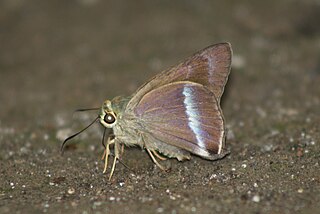
Hasora vitta, the plain banded awl, is a butterfly belonging to the family Hesperiidae which is found in India and parts of Southeast Asia.

Aeromachus pygmaeus, the pygmy scrub-hopper is a butterfly belonging to the family Hesperiidae. The species range is from India to Burma and Thailand.
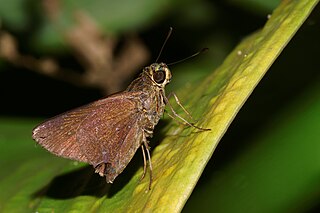
Baoris farri, commonly known as the paintbrush swift, is a species of butterfly belonging to the family Hesperiidae. It is found in India.

Borbo cinnara, commonly known as the rice swift, Formosan swift or rice leaf folder, is a butterfly belonging to the family Hesperiidae. It is found in Sri Lanka, India, Myanmar, Vietnam, Cambodia, Taiwan, and Australia.

Caltoris kumara, the blank swift, is a butterfly belonging to the family Hesperiidae.

Cupitha is a genus of butterflies in the family Hesperiidae. It is monotypic, being represented by the single species Cupitha purreea, commonly known as the wax dart.

Gangara thyrsis, commonly known as the giant redeye, is a species of butterfly belonging to the family Hesperiidae. It breeds on a number of palm species.

Matapa aria, the common redeye, is a species of butterfly belonging to the family Hesperiidae. It is found in India and Southeast Asia.
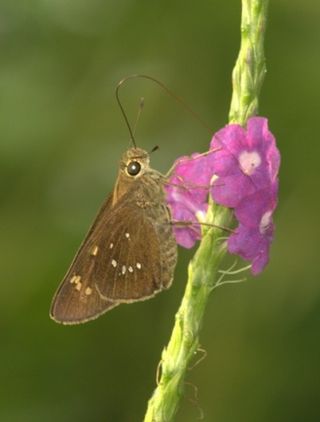
Pelopidas conjuncta, the conjoined swift, is a species of butterfly belonging to the family Hesperiidae found in India.

Potanthus pseudomaesa, commonly known as the Indian dart, is a species of butterfly belonging to the family Hesperiidae. Iit is found in India and Sri Lanka. The larvae are known to feed on Axonopus compressus.
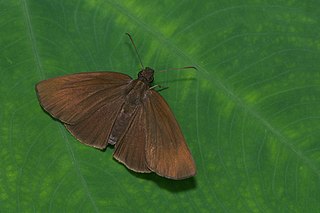
Psolos fuligo, the dusky partwing or coon, is a species of butterfly belonging to the family Hesperiidae. It is found in India. The tips of the forewings diverge outward and is a feature that is clear when they rest on vegetation.

Quedara basiflava, the yellow-base flitter or golden flitter, is a butterfly belonging to the family Hesperiidae and is endemic to India's Western Ghats.

Salanoemia sala, the maculate lancer, is a butterfly belonging to the family Hesperiidae found in India, Thailand, Laos and Vietnam.

Telicota ancilla, the dark palm dart, is a butterfly belonging to the family Hesperiidae. These species form a complex and exact species identity can only be determined by examination of the genitalia.

Spialia galba, the Indian grizzled skipper, is a hesperiid butterfly which is found in South Asia and parts of Southeast Asia.
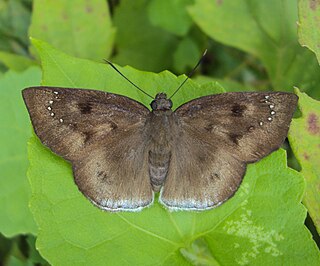
Tagiades gana, the immaculate snow flat, large snow flat or suffused snow flat, is a butterfly belonging to the family Hesperiidae found in Indomalayan realm.

Oriens goloides, the Ceylon dartlet or smaller dartlet, is a butterfly belonging to the family Hesperiidae found in India and Sri Lanka and Malay Peninsula.

Cheilocostus speciosus, or crêpe ginger, is a species of flowering plant in the family Costaceae. Some botanists have now revived the synonym Hellenia speciosa for this species.





















